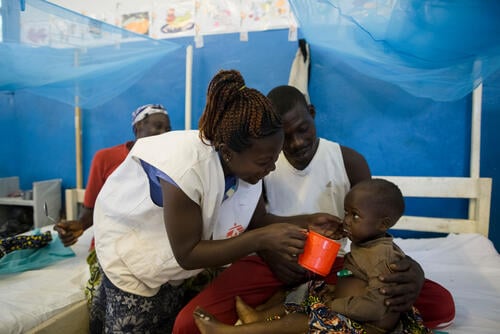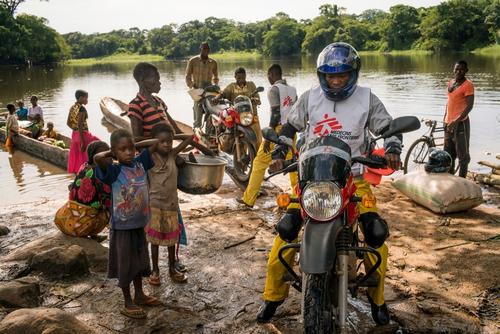The population has little access to healthcare, and epidemic outbreaks are frequent due to poor surveillance and infrastructure.
Violence has led to crises in the Kivus, Tanganyika, Ituri and Kasai regions and forced millions to flee. Three of our staff, abducted in North Kivu in 2013, are still missing.
The Democratic Republic of Congo is one of the poorest countries in the world, despite its vast natural resources. The east of the country is still reeling from the Congo Wars, which claimed an estimated six million lives from the mid-1990s to the early 2000s.
Few investments have been made since the 1960s to improve poor infrastructure and the Congolese people have little access to basic services, including healthcare. In addition to obvious barriers to healthcare in some areas due to the armed conflict, the health system lacks staff and medicine. Even the most basic health services have to be paid for and high levels of poverty mean most people can't afford them.
Life expectancy hovers at around 58 years and one in 10 Congolese children dies before the age of five.
Due to the extremely high humanitarian needs, we run one of our biggest programmes in terms of budget, the number of patients treated and number of staff. MSF teams work in 20 of the country's 26 provinces.
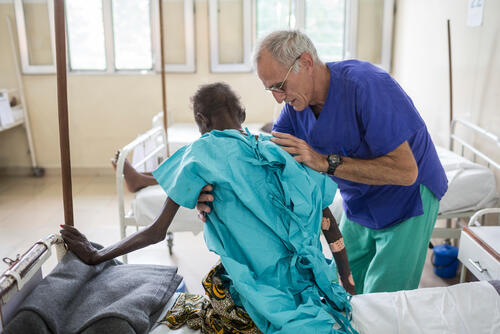
What we do in DRC
Our projects tackle acute problems deriving from conflict and crises (population displacements, conflict-related trauma, surgery) as well as gaps in, and barriers to care for health problems such as HIV/AIDS, sleeping sickness, sexual violence, malnutrition and malaria.
We also deal with frequent epidemic outbreaks of diseases that affect the country due to poor surveillance and infrastructure. These diseases include cholera, measles, yellow fever, typhoid fever, plague and haemorrhagic fevers such as Ebola.
Download a detailed report of all our activities per province in 2017 (pdf in French).
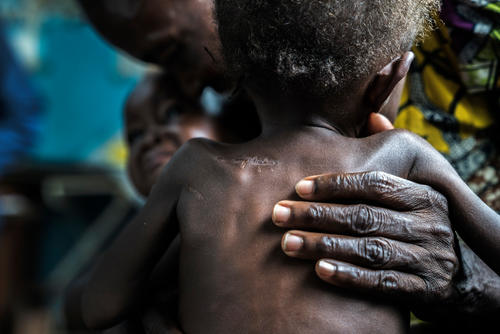
Since 2016, two new crises – in the Greater Kasai and Tanganyika regions – have triggered massive movements of people.
In 2017, the country counted 4.1 million internally displaced.
In early 2018, renewed violence in Ituri in northeastern DRC grew in intensity forcing tens of thousands of people to flee inside and outside the country.
Over 50,000 people fled across the border into Uganda where MSF teams also provided assistance.
Our emergency units
Most MSF work in the DRC is project-based in specific locations. But because of the high level of needs and poor capacity (state and non-state) to respond to recurrent crises, we also manage five emergency units.
They cover most of the country and intervene in crisis situations when our projects are overwhelmed or in areas where MSF teams aren't present. They monitor health alerts and respond to epidemics, malnutrition, natural disasters, conflicts, mass casualty situations and population displacements.
Pool d'Urgence Congo (PUC) is based in Kinshasa although it monitors health alerts in four other locations. This emergency unit can dispatch up to four teams simultaneously in 17 of the country's 26 provinces.
The Kisangani Emergency Response (KERe) unit responds to alerts in 60 health zones across Ituri, Tanganyika and Haut- and Bas-Uélé.
Our RUSK unit is mainly based in South Kivu. In 2017, it dealt with a massive measles epidemic and one of the area's worst cholera outbreaks.
SKERU is our Bukavu-based emergency response unit. In 2017, its staff vaccinated 61,387 children against measles, supported five health zones with cholera outbreaks and provided care to displaced people with malaria and malnutrition.
The North Kivu Emergency Response Unit (NKERU) is deployed using members of a regularly trained pool of medical and non-medical staff.
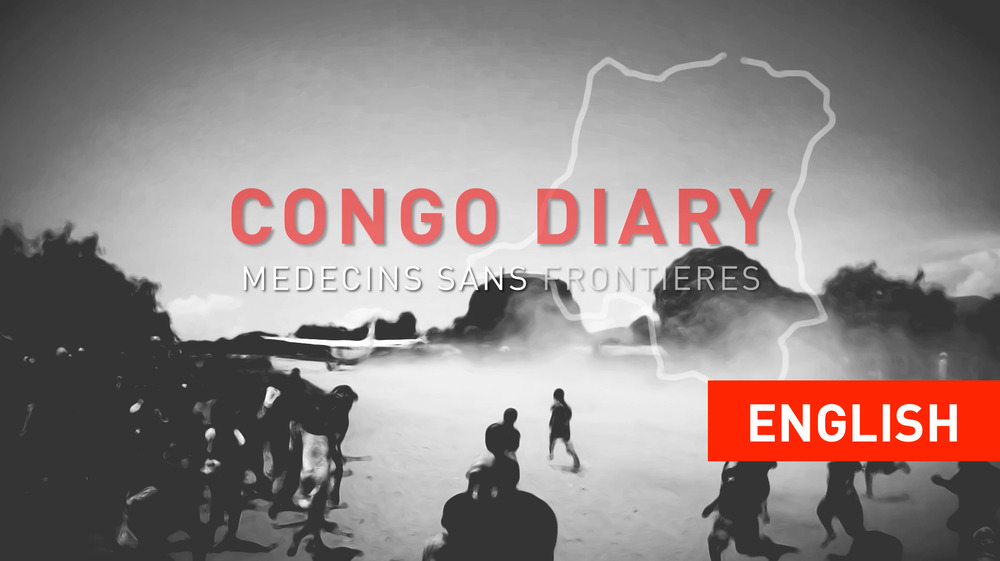
The everyday extraordinary challenge of responding to medical emergencies in the DRC
Ituri
Our mobile clinics in the villages of Karagba and Ulendere, Ituri province offer refugees and the local community basic health services. They also treat victims of sexual violence, provide family planning and mental health consultations and carry out routine vaccinations.
In December 2017, violence between communities flared up in Ituri province. It grew in intensity in February: houses were burnt, people were killed and tens of thousands fled their homes in search of safety. Some of the displaced made their way south to Bunia in DRC, whilst others travelled north to Mahagi.
The Kivus
The provinces of North and South Kivu were at the epicentre of the Congo wars and have remained unstable ever since. An estimated 120 armed groups are active and 850,000 people in the province live in camps for displaced people.
Many of the displaced, particularly in South Kivu, live in the woods or are sheltered in host communities, increasing the vulnerability of those families.
Access to healthcare is a challenge because of poor infrastructure and financial barriers. This is aggravated by constant insecurity due to the conflict that often constrains movement and access to people in need.
MSF runs 15 projects in the Kivus. In this volatile and violent area, all the projects have a strong component of conflict medicine and attempt to address general needs resulting from the lack of access to healthcare and displacement.
Our project locations in the Kivus
North Kivu
- Mweso
- Walikale
- Goma (support to the national programme against HIV/AIDS)
- Masisi
- Rutshuru
- Bambo
- Emergency interventions throughout the province are carried out by the North Kivu Emergency Response Unit (NKERU)
South Kivu
- Baraka
- Kimbi
- Kalehe
- Ziralo
- Lulingu
- Mulungu-Kaniola
- Our mobile Human African Trypanosomiasis (HAT) team, in DRC since 2013, tests and treats patients of the fatal disease in hard to reach rural areas.
Tanganyika and former Katanga province
Intercommunal violence has plagued Tanganyika since 2013. In 2016, a new wave of violence displaced an estimated half a million people in the region.
Accessing healthcare remains a challenge for many people, particularly those who have been forced to flee their villages due to violence and can't reach health centres or afford to pay for care.
Tanganyika is part of the four new provincial entities created after the split of Katanga province in 2014. The area is strongly affected by recurrent outbreaks of measles and cholera.
Our project locations in Tanganyika
- Manono
- Pweto
- Nyunzu
- Lubumbashi
Kasai
Within less than a year, the central Greater Kasai region was transformed from a peaceful area in a troubled country to one of the most serious humanitarian crises in the world today.
What started in August 2016 as a spark - the killing of a local chief by the Congolese armed forces - has led to generalised unrest flaring through an area as large as Italy. The conflict has forced 1.3 million people to flee their homes and 30,000 of them are refugees in nearby Angola.
Current projects
Kananga (Kasai Central): We have been supporting Kananga Provincial Reference Hospital (HPRK) since May 2017, with surgical activities for violent trauma, medical and psychological care for victims of sexual violence and psychological support for people traumatised by the conflict.
After completely rehabilitating the hospital's surgical wing, including a new extension that can accommodate up to 72 patients, our teams performed 1,502 emergency medical consultations, hospitalised 430 patients and performed 1,624 surgical operations between May and December 2017.
Tshikula (Kasai Central): We began supporting Tshikula General Referral Hospital and six health centres in the area in early October 2018. The population is estimated at more than 140,000 people, and the local health structures have been strongly affected by violent clashes.
In the coming months, a team of almost 60 people will support nutrition, maternal healthcare and paediatric activities, as well as mental health services and medico-surgical emergency management, providing the population with free access to healthcare.
A referral system will also be established so that patients requiring emergency intervention can benefit from the surgical care available in Kananga.
Closed projects
Tshibala (Kasai Central): During the violent clashes that swept the province of Kasai Central, the Tshibala health zone – which has around 266,000 inhabitants – was one of the epicentres of the violence. A lot of lives were lost and significant numbers were displaced.
In response to worrying rates of malnutrition, we opened a total of 12 outpatient therapeutic feeding centres and a 40-bed inpatient therapeutic feeding centre for severely acutely malnourished children under five years old.
Between December 2017 and September 2018, 2,248 patients received outpatient care and 437 were hospitalised to treat malnutrition and other diseases that often affect children in distress, such as severe anaemia and respiratory infections.
In addition to medical care, health promotion activities in local communities were carried out throughout the project to encourage families to refer children with signs of malnutrition in the shortest possible time, and then to follow up at home, to avoid cases of abandonment.
Tshibala activities ended on 21 September 2018 and our field teams focused their efforts in Kananga.
Kakenge (Kasai): In 2018, we supported the complete resumption of medical activities at Kakenge Reference General Hospital and a network of 14 health centres in the region after a spike in violence and resultant displacement. After three months, the situation improved and we handed over the project to the Congolese Ministry of Health and other organisations.
Between the beginning of April and the end of June 2018, our teams carried out more than 20,000 medical consultations, hospitalised 600 patients and treated at least 842 children, mainly for malaria, respiratory tract infections, diarrhoea and malnutrition.
Tshikapa (Kasai): Between June 2017 and April 2018, we conducted an intervention in Tshikapa and surrounding rural areas to assist the population affected by the conflict. We supported a hospital and three health centres in Tshikapa, and gradually expanded our operations to the periphery, where gaps in the provision of humanitarian aid were very significant and the population was more affected by the violence.
We donated medical and logistical equipment and trained staff from local health centres that had been looted, burnt or destroyed during the violence. Our teams treated at least 245 victims of sexual violence, conducted more than 500 mental health consultations, and performed nearly 450 surgeries and more than 9,700 paediatric visits. We also set up 18 feeding centres and treated 5,755 under-fives with severe malnutrition.
In early 2018, the arrival of other humanitarian organisations allowed us to gradually hand over these activities and focus on other emergencies in the region.
Abduction of our colleagues
On 11 July 2013, four MSF staff were abducted in Kamango, in the east of the Democratic Republic of Congo, where they were carrying out a health assessment.
One of them, Chantal, managed to escape in August 2014, but we are still without news of Philippe, Richard and Romy. We remain strongly committed to obtaining their release.



